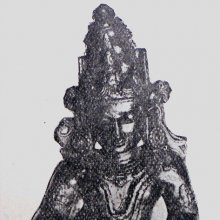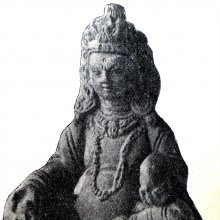Sudatta, Sudattā: 9 definitions
Introduction:
Sudatta means something in Buddhism, Pali, Hinduism, Sanskrit. If you want to know the exact meaning, history, etymology or English translation of this term then check out the descriptions on this page. Add your comment or reference to a book if you want to contribute to this summary article.
Images (photo gallery)
In Hinduism
Purana and Itihasa (epic history)
Source: archive.org: Puranic EncyclopediaSudattā (सुदत्ता).—One of the prominent wives of Śrī Kṛṣṇa. The palace Ketumān in Dvārakā, was given to this wife. (Mahābhārata, Dākṣiṇātya Pāṭha, Sabhā Parva. Chapter 38).

The Purana (पुराण, purāṇas) refers to Sanskrit literature preserving ancient India’s vast cultural history, including historical legends, religious ceremonies, various arts and sciences. The eighteen mahapuranas total over 400,000 shlokas (metrical couplets) and date to at least several centuries BCE.
In Buddhism
Theravada (major branch of Buddhism)
Source: Pali Kanon: Pali Proper Names1. Sudatta. One of the eight brahminis who was called in to examine the signs at the Buddhas birth. J.i.56; Mil.236.
2. Sudatta. A khattiya of Mekhala, father of Sumana Buddha. Bu.v.32; J.i.34.
3. Sudatta. A khattiya, father of Sumedha Buddha. Bu.xii.18; J.i.38; but BuA. (172) calls him Sudassana.
4. Sudatta. One of the chief lay patrons of Sobhita Buddha. Bu.vii.23.
5. Sudatta. The personal name of Anathapindika.
6. Sudatta. A lay disciple of Nadika who had become a sakadagamin. D.ii.92; S.v.356f.
7. Sudatta. A devaputta who visited the Buddha at Jetavana and spoke two stanzas on the value of earnestness. S.i.53.
8. Sudatta. One of the chief lay patrons of Metteyya Buddha. Anagat.vs.62.
9. Sudatta. Father of Piyadassi Buddha. Bu.xiv.15; but see Sudinna (1).
10. Sudatta. One of Sujata Buddhas chief lay patrons. Bu.xiii.30.
11. Sudatta Thera (v.l. Sudanta).
He belonged to a rich family of Velukantaka. Some give his name as Vasula. He was a close friend of Kumaputta, and, on hearing that the latter had left the world, he, too, visited the Buddha with a similar end in view. The Buddha preached to him, and he entered the Order and lived on a hill with Kumaputta, engaged in meditation. But they were disturbed by the comings and goings of numerous monks, and, owing to the disturbance, spurred on to greater endeavour, Sudatta put forth effort and became an arahant.
Ninety four kappas ago, in the time of Siddhattha Buddha, he was a householder, and going into the forest, he made walking sticks, which he gave to the monks (Thag.vs.37; ThagA.i.101f).
He is evidently identical with Dandadayaka of the Apadana, and is generally known as Kumaputtasahaya Thera. Ap.i.283.
12. Sudatta Sutta. Describes the visit of Sudatta the Devaputta to the Buddha. S.i.53.
13. Sudatta Sutta. The Buddha tells Anathapindika that he who gives food gives four things to the receiver thereof:
14. life, beauty, happiness, strength. A.ii.63.
15. Mother of Sumedha Buddha. Bu.xii.18; J.i.38.
16. An aggasavika of Tissa Buddha. Bu.xviii.22; J.i.40.
Theravāda is a major branch of Buddhism having the the Pali canon (tipitaka) as their canonical literature, which includes the vinaya-pitaka (monastic rules), the sutta-pitaka (Buddhist sermons) and the abhidhamma-pitaka (philosophy and psychology).
Mahayana (major branch of Buddhism)
Source: Wisdom Library: Maha Prajnaparamita Sastra1) Sudatta (सुदत्त) is another name for Vītaśoka, the younger brother of king Aśoka, according to the 2nd century Mahāprajñāpāramitāśāstra chapter 32.—Accordingly, “when Vītaśoka, the younger brother of King Aśoka, was king of Jambudvīpa for seven days, he was permitted to indulge in the five objects of enjoyment (pañcakāmaguṇa) on a grand scale. At the end of the seven days, king Aśoka asked him: ‘As king of Jambudvīpa, did you experience happiness (sukha) and joy (muditā)?’ Vītaśoka answered: ‘I saw nothing, heard nothing, noticed nothing...’”.
2) Sudatta (सुदत्त) is another name for Anāthapiṇḍada, according to the 2nd century Mahāprajñāpāramitāśāstra chapter 52.—Accordingly, “thus the eminent (Śreṣṭhin) Siu-ta (Sudatta) first heard the name of the Buddha, rejoiced in his heart, went to the Buddha, heard the Dharma and thus obtained bodhi”.—Sudatta, better known by he name of Anāthapiṇḍada (in Pāli, Anāthapiṇdika), heard a friend pronounce the word ‘buddha’ three times, but that was not the reason that determined his conversion. He attained, not the bodhi of the Arhats but the fruit of Srotaāpanna, when, on the next day, the Buddha gave him the graded instructions meant for lay people.

Mahayana (महायान, mahāyāna) is a major branch of Buddhism focusing on the path of a Bodhisattva (spiritual aspirants/ enlightened beings). Extant literature is vast and primarely composed in the Sanskrit language. There are many sūtras of which some of the earliest are the various Prajñāpāramitā sūtras.
Tibetan Buddhism (Vajrayana or tantric Buddhism)
Source: archive.org: The Indian Buddhist IconographySudattā (सुदत्ता) is the Śakti of Dhanada, and together forms one of the eight Yakṣa and Śakti pairs occupying the double lotus in the sādhana of Jambhala (yab-yum form), as described in the 5th-century Sādhanamālā (a collection of sādhana texts that contain detailed instructions for rituals).—Accordingly, when represented in Yab-Yum, he sits on the moon under which there is a double lotus of eight petals. [...] The eight petals of the lotus seat are occupied by the eight Yakṣas [viz., Dhanada], who are identical in all respects with the principal figure. Each Yakṣa is accompanied by a Śakti [viz., Sudattā] with whom he remains in Yab-Yum in the same way as Jambhala remains with Vasudhārā [...]. The Yakṣiṇīs are identical in form with Vasudhārā, who is yellow in complexion, carries the ears of corn and shows the Varada-mudrā in her two hands.]

Tibetan Buddhism includes schools such as Nyingma, Kadampa, Kagyu and Gelug. Their primary canon of literature is divided in two broad categories: The Kangyur, which consists of Buddha’s words, and the Tengyur, which includes commentaries from various sources. Esotericism and tantra techniques (vajrayāna) are collected indepently.
Languages of India and abroad
Sanskrit dictionary
Source: Cologne Digital Sanskrit Dictionaries: Edgerton Buddhist Hybrid Sanskrit DictionarySudatta (सुदत्त).—(1) adj., well given, properly imposed, of an ecclesiastical penance (opp. durdatta): Mūla-Sarvāstivāda-Vinaya iii.64.1; (2) (= Pali id.) given name of Anāthapiṇḍada: Mūla-Sarvāstivāda-Vinaya iii.134.6 ff.; 135.21—22; (3) name of a lay-disciple: Gaṇḍavyūha 51.9.
--- OR ---
Sudattā (सुदत्ता).—name of a yakṣiṇī: Sādhanamālā 561.1.
Source: Cologne Digital Sanskrit Dictionaries: Shabda-Sagara Sanskrit-English DictionarySudatta (सुदत्त).—mfn.
(-ttaḥ-ttā-ttaṃ) Well or properly given. E. su, and datta given.
--- OR ---
Sūdatta (सूदत्त).—mfn.
(-ttaḥ-ttā-ttaṃ) Well or entirely given. E. su, datta given, form irr.
Source: Cologne Digital Sanskrit Dictionaries: Monier-Williams Sanskrit-English Dictionary1) Sudatta (सुदत्त):—[=su-datta] [from su > su-tanaya] mfn. well or properly given (cf. sūtta), [Kāraṇḍa-vyūha on Pāṇini 7-4, 47]
2) [v.s. ...] m. Name of a son of Śata-dhanvan ([varia lectio] su-dānta), [Harivaṃśa]
3) [v.s. ...] of the rich householder Anātha-piṇḍa-da, [Lalita-vistara; Monier-Williams’ Buddhism 407]
4) [v.s. ...] of a village (also -grāma), [Uttamacaritra-kathānaka, prose version]
5) Sudattā (सुदत्ता):—[=su-dattā] [from su-datta > su > su-tanaya] f. Name of a wife of Kṛṣṇa, [Harivaṃśa]
Source: Cologne Digital Sanskrit Dictionaries: Yates Sanskrit-English DictionarySudatta (सुदत्त):—[su-datta] (ttaḥ-ttā-ttaṃ) a. Well given.
[Sanskrit to German]
Sanskrit, also spelled संस्कृतम् (saṃskṛtam), is an ancient language of India commonly seen as the grandmother of the Indo-European language family (even English!). Closely allied with Prakrit and Pali, Sanskrit is more exhaustive in both grammar and terms and has the most extensive collection of literature in the world, greatly surpassing its sister-languages Greek and Latin.
See also (Relevant definitions)
Partial matches: Datta, Cu, Shu.
Starts with: Cutattam.
Ends with: Luhasudatta, Mahasudatta, Vasudatta, Visudatta.
Full-text (+6): Saudatta, Sapatnajit, Sutta, Sudanta, Anathapindada, Kumaputtasahaya, Luhasudatta, Mahasudatta, Datta, Anathapindika, Sucanda, Sudaha, Dhanada, Sujata, Vitasoka, Sumedha, Ketuman, Sudinna, Sirima, Tissa.
Relevant text
Search found 27 books and stories containing Sudatta, Sudattā, Sūdatta, Su-datta, Su-dattā; (plurals include: Sudattas, Sudattās, Sūdattas, dattas, dattās). You can also click to the full overview containing English textual excerpts. Below are direct links for the most relevant articles:
Maha Prajnaparamita Sastra (by Gelongma Karma Migme Chödrön)
Appendix 4 - The story of Sudatta’s bodhi < [Chapter LII - Elimination of the Triple Poison]
Appendix 5 - The conversion of Śaila (Sela) < [Chapter LII - Elimination of the Triple Poison]
The story of Vītaśoka < [Class 3: The four immeasurables]
Mahayana Mahaparinirvana Sutra
Chapter XXXVI - On Bodhisattva Lion's Roar (d) < [Section Seven]
Chapter XXIV - On Pure Actions (d) < [Section Four]
Chapter XLI - On Bodhisattva Kasyapa (b) < [Section Nine]
The Great Chronicle of Buddhas (by Ven. Mingun Sayadaw)
Buddha Chronicle 11: Sumedha Buddhavamasa < [Chapter 9 - The chronicle of twenty-four Buddhas]
The Story of the Five Bhikkhus (Pañcavaggī Theras) < [Chapter 1 - The Jewel of the Buddha]
Part 1 - Singular Opportunity of Living in an Age when a Buddha appears < [Chapter 2 - Rare Appearance of a Buddha]
The Indian Buddhist Iconography (by Benoytosh Bhattachacharyya)
The Fo-Sho-Hing-Tsan-King (A Life of Buddha) (by Samuel Beal)
Lives of Buddha (5): Cung-pen-k’i-king < [Introduction]
Varga 18. Conversion of the 'Supporter of the Orphans and Destitute' < [Kiouen IV]
Buddhist records of the Western world (Xuanzang) (by Samuel Beal)
Chapter 1 - Country of Shi-lo-fu-shi-ti (Shravasti) < [Book VI - Four Countries]



